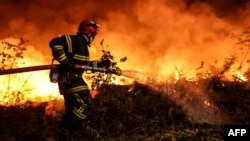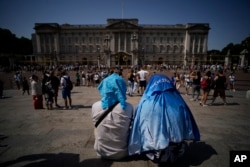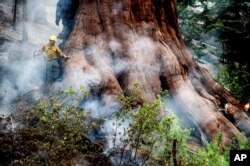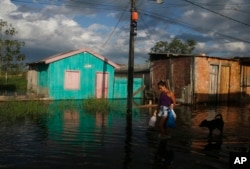Officials from 40 countries met Monday in Berlin, Germany to discuss how to fight climate change as record heat waves and wildfires continue around the world.
U.N. Secretary-General Antonio Guterres spoke to the gathering over video link. He warned that the world would not meet its goal of limiting planet warming to 1.5 degrees Celsius as agreed to in the 2015 Paris climate agreement.
Antiguan Environment Minister Molwyn Joseph spoke for the developing island nations at risk in the Caribbean Sea and the Pacific Ocean. “What it is described as crisis, for us it is catastrophe,” he told delegates. “There are small islands that are disappearing.”
British official Alok Sharma led the 26th United Nations Climate Change Conference in Glasgow last year. He said, “As this meeting is taking place, parts of Europe are baking, indeed they’re burning; and sadly, it’s an experience that is all too familiar to many millions across the globe already.”
Record heat in Europe
In Britain Monday, the government announced “national emergency” conditions because of dangerously high temperatures. By the middle of the day the country reached 35 degrees Celsius and is expected to go as high as 40 degrees.
That would be the highest temperature on record for the country.
Few homes or businesses in Britain have air conditioning since the average July temperatures range from a daily high of 21 degrees Celsius to a low of 12 degrees Celsius.
Kit Malthouse, a minister in charge of government coordination, told BBC radio, "We've got a difficult 48 hours coming.” Meanwhile, train lines canceled services, some schools were closed and officials urged the public to stay home.
The heat wave is felt across Europe leading to wildfires in France and Spain.
In southern France, 1,700 firefighters are battling the wildfires that have already burned 140 square kilometers. Officials said around 20,000 people have been forced from their homes in the Gironde area since last week.
Local fire chief Marc Vermeulen said, “The fire is literally exploding.” He called the situation “extreme and exceptional.”
In Spain, a firefighter and a sheep farmer died in fires in northwestern Zamora. Thousands of people had to flee their homes. The fires burned 220 square kilometers of forests.
“Climate change kills,” Spanish Prime Minister Pedro Sánchez said Monday during a visit to Extremadura, where firefighters are battling three other major fires. “It kills people, it kills our ecosystems and biodiversity,” he added.
Spain's Carlos III Institute records daily temperature-related deaths in the country. It reported 237 deaths because of high temperatures from July 10 to 14. That was compared to 25 heat-related deaths the previous week.
Heat warning in the U.S.
Across the Atlantic, the U.S. National Weather Service on Monday issued “dangerous and record-breaking heat” warnings to much of the Great Plains and the South.
The service also warned people in the northern Rockies that strong winds and dry weather conditions could start wildfires in the area.
Over the weekend, firefighters were able to contain wildfires that burned for more than a week in California’s famed Yosemite National Park.
In Mariposa Grove, the firefighters saved more than 500 giant sequoia trees from damage, but the area will remain closed to visitors. The giant trees grow to be about 76 meters tall and live more than 3,500 years.
Prolonged heatwave in China, South Asia
In China, the summer heatwaves are expected to return this week across large parts of the country.
The China Meteorological Administration said Sunday that temperatures are expected to reach between 39 to 42 degrees Celsius in the southern area. The heat will last nationwide for an “extended period” of 40 days, up from the usual 30 days.
Just in the past two weeks, the 35-degree temperatures have damaged roads and sickened people.
Since the beginning of March, India, Pakistan and large parts of South Asia have experienced unusually long periods of hot weather.
The Indian Meteorological Department said the month of March was the hottest in India since records began 122 years ago. The agency said temperatures were 3 to 8 degrees Celsius above average, breaking many all-time records. In several Indian states, the temperatures ranged from 40 to 44 degrees Celsius in the last days of March.
The World Weather Attribution is a group of climate scientists that study weather events around the world. It said, “because of climate change” events such as the heatwave in India “increased by a factor of about 30.”
The group added that global warming was also the cause of the April rainfall and flooding in South Africa and floods and landslides in Brazil in May.
I'm Jonathan Evans. And I'm Faith Pirlo.
Hai Do wrote this story for Learning English with additional reporting from Reuters and The Associated Press.
______________________________________________________________
Words in This Story
catastrophe - n. terrible disaster
bake - v. to cook in an oven
globe - n. the earth
literally - adv. used to stress a statement or description that is true and accurate though it may be surprising
biodiversity - n. the existence of many kinds of plants and animals in an environment










Forum